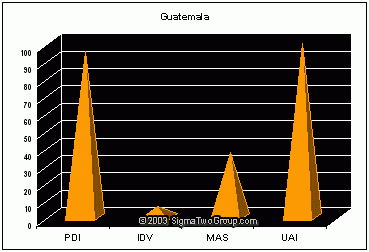It’s obvious that business culture is different in different countries – but different how? How much is myth and prejudice and how much is fact? Are Americans really brash and superficial? Are the Germans really punctual and humorless? Or as I heard one stand-up comic say once: “Laughter is a wonderful thing. Where would we be without laughter? [pause]. Germany!”
Gerd Hofstede to the rescue. Hofstede is a Dutch Sociologist who has been analyzing business culture in different countries for over 40 years.
He also quantifies the prevailing business culture in 4 dimensions:
Power Distance Index (PDI). This is the extent to which the less powerful members of organizations and institutions accept and expect that power is distributed unequally.
Individualism (IDV). The degree to which individuals are integrated into groups. On the individualist side we find societies in which the ties between individuals are loose: everyone is expected to look after him/herself and his/her immediate family. On the collectivist side, we find societies in which people from birth onwards are integrated into strong, cohesive in-groups, often extended families (with uncles, aunts and grandparents) which continue protecting them in exchange for unquestioning loyalty.
Masculinity (MAS). Masculine cultures are very assertive and competitive, feminine cultures are modest and caring.
Uncertainty Avoidance Index (UAI). This deals with a society’s tolerance for uncertainty and ambiguity. It indicates to what extent a culture programs its members to feel either uncomfortable or comfortable in unstructured situations.
Here, for example, is Denmark:

As you can see, Danish business culture has a very low power distance. This is typical for Danish workplaces, where employees will always call managers by their first names and you rarely see a manager giving a direct order. The Culture in Denmark tends towards the individualistic rather than collective and is very feminine. This means that even though Danes don’t see themselves as integral parts of a collective, there is still a huge focus on other people’s emotional state. Finally, uncertainty avoidance is very low, meaning Danish workplaces can take uncertainty. Indeed, a typical Danish attitude would be “Don’t tell me how to do my job, I’d rather figure it out for myself.”
Let’s compare that to the US:

Power Distance is higher and the culture is more masculine but what really sticks out is individualism. As you might expect, American workplaces are characterized by high levels of individualism and less of a sense of belonging to a collective.
Finally, the reason I’m writing this blog post: Guatemala. I’m writing this in my hotel room in Guatemala City, and tomorrow I’m keynoting at a conference for 200 HR managers. So of course I wanted to know what the business culture here is like. Take a look at this:

Check out that Power Distance! As Hofstede writes:
Guatemala has the highest Uncertainty Avoidance (UAI) Hofstede Dimension ranking of all Latin countries, indicating the society’s extremely low level of tolerance for uncertainty. In an effort to minimize or reduce this level of uncertainty, strict rules, laws, policies, and regulations are adopted and implemented.
Guatemala is tied with Panama for the highest Power Distance (PDI) ranking among Latin countries with a 95, compared to an average of 70. This is indicative of a high level of inequality of power and wealth within the society.
The question I have to ask is (of course) this:
What business culture is most conducive to happiness at work.
Unsurprisingly, my answer is: The Scandinavian (which is almost identical to the one shown above for Denmark). Indeed, when you look at studies comparing happiness at work in different countries, the Scandinavian nations are always at the top (and #1 is usually Denmark).
And I think that Hofstede’s work gives us part of the reason why this is so:
- Low power distance means employees typically have control and influence over their own work situation.
- A tendency towards the individualistic means that each individual is free to pursue their own happiness, but is still connected to the group.
- A feminine culture means that people care about each other.
- Low uncertainty avoidance is a must in an ever-changing world.
So I believe that companies who pursue a culture and a set of core principles that are in line with this will be happier workplaces – and, as studies show, happy companies make more money. On the other hand, companies that go for masculine cultures with high power distance will end up being very unhappy and will ultimately have their butts kicked by their happy competitors!
Your take
What’s the culture like in your country? You can look up your own country’s culture here. Let me know what you find and whether or not you agree :o)











